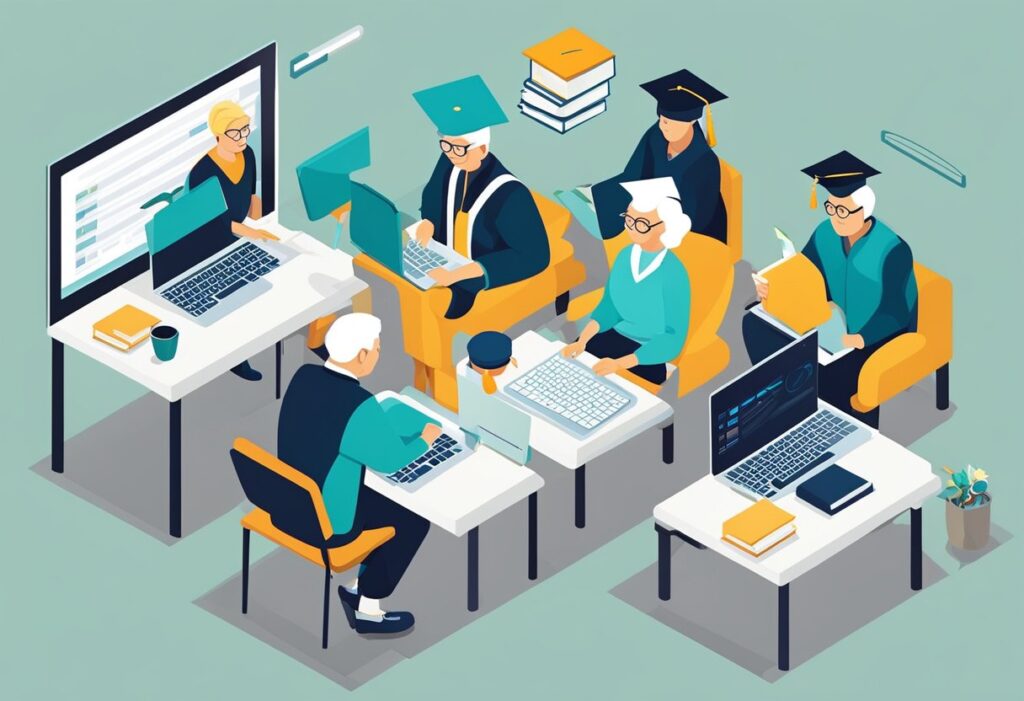Free Online College Courses for Senior Citizens
Education is a journey that doesn't have a set endpoint. Senior citizens have the opportunity to pursue college degrees, learn new skills, or simply engage their minds through various online programs.
Many institutions offer free online courses that can help them meet their personal and educational goals, whether they are starting from scratch or finishing what they began years ago.
This article provides a comprehensive overview of the best free online degree programs tailored for older adults. It discusses the many advantages of college courses for senior citizens and offers insight into selecting suitable online programs.
With guidance from experts, the exploration will shed light on what seniors need to know about furthering their education in a digital format.
Key Takeaways
- Senior citizens can benefit greatly from taking online college courses.
- There are many free options available for older adults to pursue their education.
- Choosing the right program is essential for a successful learning experience.
Reasons for Seniors to Enroll in College Courses
Keeping the mind sharp is essential as individuals age. Engaging in online courses provides an excellent opportunity for senior citizens to learn new skills and information. This type of lifelong learning positively influences their mental health by enhancing cognitive function and reducing feelings of loneliness.
Retirement often results in a shift in identity and daily routine. Online education can help seniors regain structure in their lives. It encourages them to set goals, complete assignments, and interact with learning materials, fostering a renewed sense of purpose. By doing so, they can experience greater personal fulfillment and achievement.
Additionally, online courses can open doors to new interests and hobbies, allowing seniors to explore their passions. For those who are still employed, these courses offer a flexible way to acquire new skills, benefiting both career advancement and potential job changes.
Key Benefits:
- Cognitive Engagement: Keeps the brain active.
- Social Interaction: Reduces feelings of isolation.
- Structured Routine: Helps create a sense of daily structure.
- Skill Development: Equips them with new skills for career progress.
Investing in education can lead to a richer, more fulfilling life during retirement or while still in the workforce.
How to Take Online College Classes for Free as a Senior Citizen
Tuition Waivers
Many public universities offer programs that allow senior citizens to enroll without paying tuition. These programs vary by state, with most states featuring options for senior tuition waivers at state-supported colleges. While some states limit waivers to two-year community colleges, others extend them to four-year institutions as well. The age at which seniors become eligible for these programs usually falls between 60 and 65 years. Interested individuals should reach out to their desired college to confirm participation in a tuition waiver program and inquire about specific eligibility criteria.
Auditing
Seniors can also enjoy the benefits of college courses by auditing classes. This option often allows students to attend courses where seats are still available without incurring any fees. Auditing a course enables seniors to engage with the material and complete assignments, but it typically comes with limitations. Specifically, audited courses usually do not provide any grades or allow participation in exams. As a result, this method is not intended for those who wish to earn a degree but can be an excellent way to learn and stay active in a learning environment.
Free Courses/MOOCs
Prestigious institutions like Harvard, Yale, and Stanford provide massive open online courses (MOOCs) through platforms such as EdX and Coursera. These MOOCs offer students from all over the globe the chance to learn from esteemed professors and professionals across various subjects. Most platforms feature a free enrollment option that allows access to course materials for a limited time. Alternatively, paid options may offer certificates upon completing the coursework. While these online classes can enhance skills or introduce new topics, they generally do not result in earning a full degree.
Discounts
Just like other areas of life, senior citizens can take advantage of special tuition discounts at many colleges and universities. Numerous educational institutions provide reduced tuition rates for seniors who meet specific age or financial criteria. Additionally, several scholarships exclusively for older learners may further enable access to higher education at a lowered cost. These financial breaks can make it simpler for seniors to pursue learning opportunities without the burden of significant tuition fees.
What Senior Citizens Should Know About Online Degrees and Courses
Familiarity With Technology
For senior citizens interested in online education, having a basic understanding of technology is essential. A dependable computer and a high-speed internet connection are crucial for activities like streaming lectures, downloading materials, and submitting assignments. Most online programs use education platforms such as Canvas or Blackboard, which provide access to course content and facilitate communication through forums and messaging.
Students participating in live classes also need functional cameras and microphones to engage effectively. Comfort with these tools is necessary for meaningful participation. Additionally, being able to troubleshoot any connectivity issues will help ensure a smooth experience when attending classes and completing assignments.
Formats for Course Delivery
Online courses generally come in several formats.
- Synchronous Classes: These classes occur at specific times, allowing real-time interaction through video conferencing. They require students to follow a set schedule.
- Asynchronous Classes: These are more flexible, enabling students to learn at their own pace. Pre-recorded videos, reading assignments, and independent work form the basis of the curriculum. Interaction with instructors and peers may not occur in real-time, but students have the freedom to study when it works for them.
- Hybrid Formats: Some educational programs blend in-person and online components, offering the best of both worlds.
Each format has its advantages, and students should choose one that aligns with their learning style and schedule.
Experience as a Student
The experience of taking online courses can differ significantly from traditional classroom learning. Online courses often require students to take initiative, especially in asynchronous formats where students work independently. Communication with instructors and classmates typically occurs via email or discussion boards, which may limit personal interaction.
For seniors who value engagement and support, attending synchronous classes may be more suitable. These classes provide opportunities for direct contact with peers and teachers, fostering a more interactive learning environment. Additionally, many institutions offer extracurricular activities for online students, enhancing their social experience.
Costs to Consider
While many online degrees and courses may be labeled as free, it is important for students to be aware of potential costs. Essential expenses often include:
- Technology Needs: A reliable computer, microphone, camera, and high-speed internet connection are crucial for online learning.
- Materials: Depending on the course, specific software or textbooks may be required. Some schools also charge minimal fees for tech support or online resources.
Financial aid options, such as scholarships and grants, might be available to help cover these costs. Understanding the full financial picture can help students prepare better and avoid surprises.
How to Select the Right Free Online Degree Program
Choosing the ideal free online degree program involves careful thought and understanding of personal goals. Seniors looking to pursue education should first consider whether they want to take a few courses to explore new interests or if they aim for a full degree. For those opting for a degree, decisions must be made on what type of degree they wish to pursue, such as an associate, bachelor’s, or even an MBA.
Once they have clarity about their educational aspirations, the next step is to investigate appropriate programs. Online resources, like search engines and directories, can provide essential information about accredited institutions, including options like the University of the People and its offerings. Exploring these platforms will help identify tuition costs and course listings.
Connecting with academic advisors at colleges, including the University of Georgia, can also lend insights into specific program requirements and available courses. Furthermore, professional organizations often have resources related to job market demands and may offer relevant courses.
Lastly, seeking advice from friends and family who have experienced online learning can provide valuable recommendations tailored to personal preferences and needs. Gathering diverse opinions will aid in making an informed decision about the right program, ensuring it aligns with individual goals and lifestyles.
Frequently Asked Questions
Are there any online colleges that offer free tuition for senior citizens?
Yes, various online colleges provide opportunities for senior citizens to enroll in free courses or programs. Some institutions have specific programs aimed at older learners, allowing them to further their education without the financial burden. These programs can vary by state and availability.
What types of degrees can seniors pursue for free online?
Senior citizens can pursue a variety of degrees online at no cost. Common degrees include associate degrees and bachelor's degrees in fields like liberal arts, business, and health sciences. Also, many community colleges offer certificate programs related to specific career skills.
How do senior citizens qualify for free online college courses?
Qualification for free online courses often depends on age and residency. Most programs target individuals over a certain age, typically 60 or 65, and may require proof of age. Additionally, there might be residency requirements related to the state or institution offering the courses.
What resources are available for seniors seeking free online education?
Several resources exist for seniors aiming to find free online education options. They can explore websites dedicated to education for older adults, community college offerings, and nonprofit organizations that partner with educational institutions to provide accessible learning.
Which accredited institutions provide free online degree programs for seniors?
Some accredited institutions known for offering free or low-cost programs to seniors include community colleges and universities with specific initiatives for older learners. Institutions may vary by location and should be checked for their specific offerings and accreditation status.
At what age can adults take advantage of free college education in the United States?
Generally, adults can take advantage of free college education programs starting at the age of 60 or older, depending on the institution. Some programs offer reduced tuition or free courses to learners who meet the age requirement, fostering lifelong learning opportunities for seniors.







